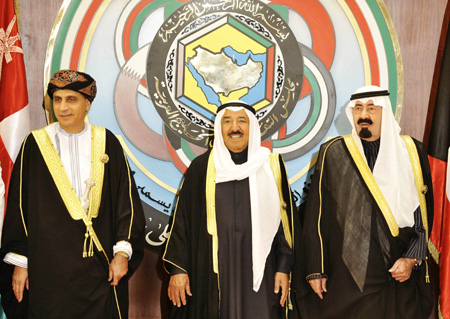GCC leaders meet in 30th summit for economy, regional issues
Leaders of the six-member Gulf Cooperation Council (GCC) on Monday started their 30th summit in Kuwait City to discuss economy and regional hot-spot issues.
 |
|
Kuwaiti Emir Sheikh Sabah al-Ahmad al-Jaber al-Sabah(C), King Abdullah of Saudi Arabia(R) and Deputy Prime Minister of the Sultanate of Oman Fahd Bin Mahmoud Al-Said pose for the group photos before the opening session of the 30th annual summit of the six-nation Gulf Cooperation Council (GCC) held in Kuwait city, capital of Kuwait, Dec. 14, 2009. [Zhang Ning/Xinhua] |
Addressing the opening session, Kuwaiti Emir Sheikh Sabah Al-Ahmad Al-Jaber Al-Sabah said the summit was held amid crucial challenges at the security, economic and political fronts, adding the launch of the electricity linkage and approval of the long-expected monetary union would push forward the bloc's economic integration process.
He called on member countries to intensify efforts to enhance mutual Gulf work to materialize various projects and plans.
Expressing condemnation of the terrorist attacks in neighboring Iraq, he said "we look forward to the continuity of the political process in Iraq reaching the execution of parliamentary elections in democratic and stable atmospheres to realize security, stability, political harmony and economic development for the Iraqi people."
But the emir did not touch upon the recent Dubai debt crisis in his short speech.
After the speech, the leaders turned to a closed session to focus on the Gulf monetary union and the launch of the 1.6-billion-dollar electricity linkage project between member countries.
The oil-rich GCC was established in 1981 and groups Bahrain, Kuwait, Oman, Qatar, Saudi Arabia and the United Arab Emirates.
Sitting atop the largest crude exporting region in the world, the six countries together hold around 45 percent of the global oil reserves and contribute 16 million barrels of crude per day.
Since its establishment, member countries have strived for economic integration and gained steady growth in financial, transportation and real estate sectors.
Comments
Add your comments...
- User Name Required
- Your Comment
- Comments are moderated and generally will be posted if they are on-topic and not abusive.
 0 Comments
0 Comments






